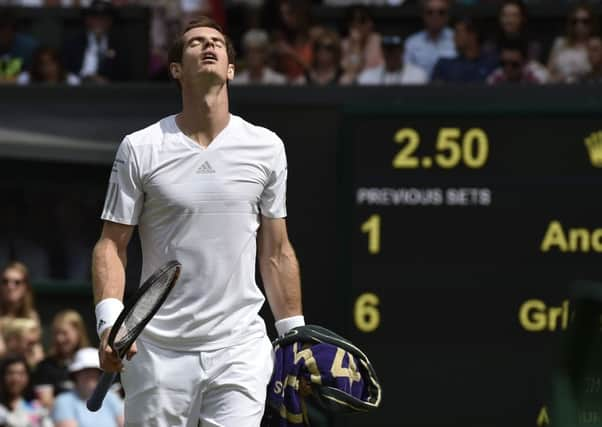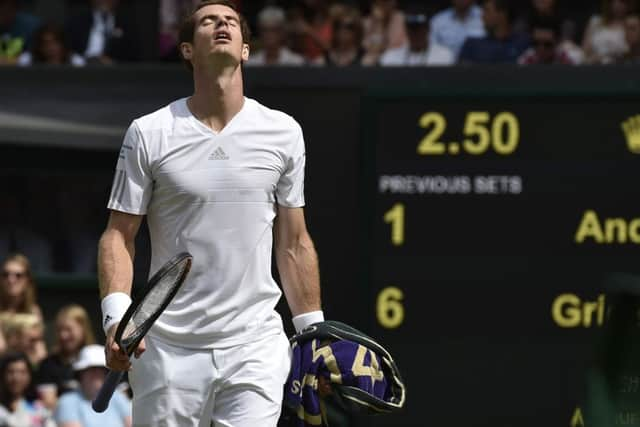Wimbledon: Andy Murray out as Dimitrov marches on


This was not merely a below-par showing by the Scot. It was his worst display at Wimbledon since 2008, when he also suffered a straight-sets loss in the last eight, to Rafael Nadal.
That was probably the most shocking thing about Murray’s performance. If he had gone down in flames, all guns blazing, it would have been a lot easier for his supporters to accept.
Instead, he went down in ashes.
Advertisement
Hide AdAdvertisement
Hide Ad

Take nothing away from Dimitrov’s own performance. The Bulgarian played fearlessly, aggressively, and with marvellous versatility. At 23, he is more than ready to make a major breakthrough. This was his first win over a top-ten player, and is also the first time he has reached the last four of a Grand Slam.
The sad thing, however, was that he did not even have to play with such adventure. A bit of caution here and there, a more conservative approach at times, and he would still have won with something to spare. Four years younger than the No3 seed, Dimitrov looked, for almost all of the match, like the senior player – more experienced on the big stage, more mentally self-reliant, more at ease with himself.
By contrast, there were times when Murray’s frustration with his inability to fight back was expressed in the sort of body language we saw in his late teens and early 20s, when his dissatisfaction would lead to little bouts of petulance.
Since his first victory in a Slam, the US Open of 2012, he has acquired an air of seniority that has set him apart from the tour’s young pretenders and put him firmly in the same bracket as Roger Federer, Rafael Nadal and Novak Djokovic. If that air was present at all on Centre Court yesterday, it surrounded Dimitrov.
Speaking after his defeat, Murray defined it as a bad day at the office, but explained he had had no inkling earlier in the day that his play would be that little bit off kilter. He had not got out of bed on the wrong side and continued to suffer one minor mishap after the other. Everything had gone as normal, up to and including the warm-up.
In fact, let’s make that up to and including the first two games, because Murray, having won the toss and chosen to receive serve, got off to an encouraging start. He had a break point on the No 11 seed’s serve in that opening game, and held his own serve without losing a point in the second. That may not have given him an advantage on the scoreboard, but it was the sort of start you would expect the more highly ranked player to make, and it was enough to suggest that the balance of the contest was tipping ever so slightly towards the British man.
Later, Murray identified that segment of the match, and a stage late in the second half, as the two potential turning points. He knew Dimitrov was under pressure then; he knew those phases were his chances to put the Bulgarian’s self-belief under real scrutiny; and he knew he had failed to do so.
Those stages were the closest Murray came to high points in the match, and they were severely outnumbered by low points. After Dimitrov had played more confidently to move 2-1 ahead in the first set, for example, the Scot served poorly to allow himself to be broken. He was broken again in the sixth game, though this time Dimitrov’s superlative returning had more to do with it. The set had taken just 25 minutes, with Murray looking sluggish, slow to react to what was unfolding around him, and well short of his usual energy levels.
Advertisement
Hide AdAdvertisement
Hide AdThe atmosphere was pretty flat as well, with Murray giving them very little to cheer about. They were far noisier, however, after he took the opening game of the second set, responding well to his pleas to make their support more vocal. Their hopes of a revival were short-lived, as on his next service game he served two double faults in the space of three points. He got out of that scrape, but was broken in the seventh game to go 3-4 down.
Then he broke back immediately, and the relief around the court was palpable as the spectators saw a glimmer of hope. When Dimitrov double-faulted at 5-4 down, Murray was just two points from winning the set – but any notion that the Bulgarian was becoming nervous soon turned out to be erroneous.
At least Murray saved two break points in the 11th game, but Dimitrov held serve easily to take the set into a tiebreak. He was behind in it only once, at 3-2, and won it 7-4 with little difficulty.
We consoled ourselves then with the knowledge that Murray had won his last five five-set matches, but the obvious problem with that particular statistic was the fact he was a long way away from forcing the match to go on that long. Indeed, far from looking like winning the third set at any point, he began to succumb to a feeling of inevitability. He had given the match everything he had, and by that time he knew full well that it was not enough. When Murray double-faulted to go 4-2 behind, the end was in sight. It came two games later when he was broken again.
Fittingly, the champion played the final stroke himself, sending a shot into the net. It was a reminder that Murray had contributed to his own downfall as much as Dimitrov, for all his virtues, had done.
Such a tame and sad ending, it also, curiously, produced some hope. We might have felt prouder had Murray played at his best yet still lost, but such an outcome might have been more ominous.
Instead, we know that Murray can, and will, play far better. The title has gone: the belief has to remain.